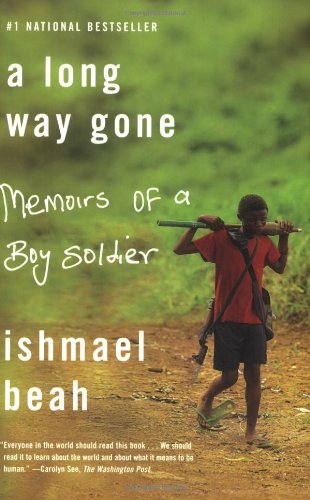All Nonfiction
- Bullying
- Books
- Academic
- Author Interviews
- Celebrity interviews
- College Articles
- College Essays
- Educator of the Year
- Heroes
- Interviews
- Memoir
- Personal Experience
- Sports
- Travel & Culture
All Opinions
- Bullying
- Current Events / Politics
- Discrimination
- Drugs / Alcohol / Smoking
- Entertainment / Celebrities
- Environment
- Love / Relationships
- Movies / Music / TV
- Pop Culture / Trends
- School / College
- Social Issues / Civics
- Spirituality / Religion
- Sports / Hobbies
All Hot Topics
- Bullying
- Community Service
- Environment
- Health
- Letters to the Editor
- Pride & Prejudice
- What Matters
- Back
Summer Guide
- Program Links
- Program Reviews
- Back
College Guide
- College Links
- College Reviews
- College Essays
- College Articles
- Back
A Long Way Gone by Ishmael Beah
A Long Way Gone is an autobiography of the early life and struggles of Sierra Leonean, Ishmael Beah. He tells the story of how a journey he started with his friends to a village a few miles away from his home turned into a nightmare. Sierra Leone’s government was in the middle of a civil war with rebels. The village he had traveled to with his friends was attacked by rebel soldiers. For months after the attack, Ishmael flees from village to village with different groups of people, constantly being chased by the threat of being captured as a child soldier. Eventually Ishmael was captured by the government’s army and was forced to fight for several years. Workers sponsored by the United Nations finally rescue him along with numerous other child soldiers. This rescue begins Ishmael’s new life, one that proves every bit as difficult as the one he just fled.
Start to finish, this book is suspenseful with gruesome details of what life is like in war. Ishmael seeks to send a message through his writing: the need for peace. He has a firsthand account of what it is like to be a child soldier. As the reader is taken on a journey, they are immersed in horrors only imaginable in fiction. More than just telling a story, Ishmael conveys a point: humanity is easily corrupted.
One of the most notable lines throughout the entire book is when a boy named Saidu sums up his emotions in a single sentence.
“After a few hours had gone by, Saidu spoke in a very deep voice, as if someone were speaking through him. ‘How many more times do we have to come to terms with death before we find safety?’ he asked.” (pg. 70)
This passage shows how much the war has affected these children. It has torn apart everything they once knew and loved. At this point in their lives, they want the certainty of either safety or death. Continuing to face potential death is one of the boys’ biggest fears now.
One of the best characteristics of this book is that it is extremely engaging. No storyline or plot like this could ever have been imagined. Another distinguishing feature is the imagery used when describing the events of the book. One of the most vivid uses of imagery throughout the entire book is when Ishmael is leaving a village under rebel fire and along the road he sees people vomiting blood, others covered with bullet holes, and entire families lying dead outside their houses. While these features create an exceptional story, there is one area of possible improvement. Occasionally, Ishmael will break into the story he is telling of his past with short inserts of his current life. While it is important for the reader to understand how Ishmael’s past affects his present, these passages often cut into the flow of the rest of the book.
I would recommend this book to any reader aged fourteen or older. While the reading level of this book is not extremely difficult, there are many disturbing details, acts of violence, and inappropriate behavior that anyone younger than fourteen does not need to be reading. Other than the age restriction, I feel that everyone, especially those in developed countries interested in global issues, should make it a point to read this book. It paints a picture of what life is like for the millions of children living in fear of being abducted and thrown into a war.
Once I completed A Long Way Gone, I gained a new perspective of what it means to be afraid. In first-world countries we feel that we have issues. Compared to the struggles of children living in war-torn countries, we have no problems. I have been reminded of the importance of being thankful for what I have, not being mad about what I do not have.
Similar Articles
JOIN THE DISCUSSION
This article has 0 comments.

